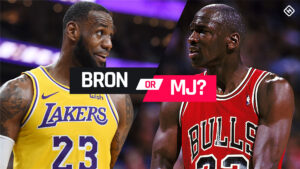Hunter’s Sports Soliloquies: LeBron or Michael?

So this is exactly what it sounds like it’s going to be, the paper version of my stream of consciousness as it relates to sports.
Since quarantine, we’ve all spent ungodly amounts of time sitting in our own rooms, doing some combination of “doomscrolling,” trying to keep up with work, and, if you’re anything like me, hashing out some of the all-time sports arguments with friends over text, socially distanced meetups, or in many cases, out loud to ourselves while lying in bed.
We’re starting heavy folks, and in the wake of the NBA finals, I think it’s time to revisit Michael Jordan vs. LeBron James as the greatest NBA player of all time.
Disclaimer: I truly do loathe this comparison, and any basketball fan with a critical eye knows that Magic Johnson is a better comparison for LeBron and Kobe for Mike, respectively, but that’s a different conversation that we might just have a little later on. Also, for what it’s worth, Kareem Abdul-Jabbar is my GOAT, but I’m going to stop giving away future installments and feed the fire of this one.
LeBron James is a better all-around basketball player than Michael Jordan, who had a better career than him. Both of those statements are okay.
Everyone okay? Survive that? Did I lose half the readers? Most likely. If you’re still here, allow me to explain how I came to this conclusion.
When this argument starts to ramp up, people love to point to Jordan’s 6-0 record in the finals as the main argument for the GOAT. “LeBron’s 4-6, Jordan’s 6-0, just by those two stats, the conversation is over,” they say.
This is a bad argument because it’s immediately basing overall career accomplishments around rings when legends like Bill Russell (11), crucial role players like Robert Horry (7), and household names like Jim Losutcoff and Frank Ramsey (7 each) exist. It also chooses to negate earlier playoff exits, which LeBron fans use as their main argument.
Here’s the thing though, Jordan did always close when he needed to, and while it is realistic to say that LeBron had to deal with dynasties like San Antonio in the 2000’s and early 2010’s and Golden State in the latter part of the decade, he couldn’t always get it done by himself.
Now did Jordan always do it by himself? No, but he always put himself in the position where he could be the guy at the end of the game. This is why the Kobe comparison is better, but again, I won’t digress.
Getting away from playoffs and pure championship accolades, on-court accomplishments and statistics are as important if not more when examining the full body of work.
Physically, it’s unrealistic to say that Jordan is who you’d rather have than James, who at 6’8-plus and around 250 pounds, is more comparable to a graceful Karl Malone. Even Jordan at his most physically imposing still loses a couple inches in height and almost 35 pounds to LeBron.
This contributes to LeBron’s superior rebounding, field goal percentage, and effective field goal percentage. Those track at 7.4 to 6.2, 54.9% to 51.0%, and 54.1% to 50.9%, respectfully.
When it comes to scoring, Jordan has the edge, which is another stat that is tossed around a lot. It doesn’t hold much validity on its own because of the clear differences in play style between the two.
LeBron’s role as a point forward is to initiate offense and create for others, as opposed to shouldering the total offensive load by himself, often through drive and kicks and high pick and rolls.
Jordan was an isolation scorer in a different era of basketball, so the three-point difference between the two is not surprising. It does reflect in career assist averages and getting their teammates involved, with LeBron having a 7.4-6.2 advantage on that front.
On the defensive side of the ball, statistics favor Mike, with even block averages for their careers, and Jordan having a 2.3-1.6 advantage in steals, it shows his tenacity as an on-ball pest to opposing guards. Physicality comes into play again when you think of the role LeBron has taken as the ultimate switching defender, often guarding positions 1-5 on a nightly basis.
Defense is hard to quantify without diving deep into some heady stats, so let’s move onto accolades and wrap this thing up so we can all walk away a little more well-rounded and logical in our basketball viewing and debates.
They match each other with a Rookie of the Year award, and in fewer of years played, Jordan has the advantage in both season MVP’s (5-4) and finals MVP’s (6-4), though it’s worth noting that both of them won finals MVP each time they won the finals.
All-NBA first teams and total All-NBA appearances go to LeBron (13/16 to 10/11), with Jordan staking his claim on the defensive side of the awards (1x DPOY, 3x steals champ), further well-rounding his career in comparison. It’s well-known and documented that LeBron has never won a Defensive Player of the Year award, and continues to be dwarfed in appearances on All-Defensive teams by Jordan (9 total, 9 first to 6 total, 5 first).
The last accolade that is objectively important to point to is scoring titles, which Jordan has 10 to LeBron’s 1. This is a cementing fact that on paper as it stands, he has had a better career, but this is still a bad way to justify the comparison between the two, as the way that Jordan played innately favored him to win the award more frequently.
At the end of the day, trying to compare the careers of these two all-time greats will have many people coming away with Jordan looking better when it’s all said and done, but if you ask true basketball fans, they know that there are plenty of things you can point to that favor LeBron when it comes to on-court skills and what he brings night in and night out.
It’s not a good argument, but it still will go down of the most spirited debates in the annals of armchair analyst history.
I tried my best to supply statistics and numbers that support the greatness of both of these two legends, and if nothing else, I hope this inaugural installment makes you think about the breadth that we can think about sports.
Also, for the people that can’t help but hate LeBron for reasons that don’t have to do with basketball, you should probably appreciate his prolonged greatness before you have to explain to your kids how wrong you were in 20 years when he’s going to continue to be thought of in the Greatest of All-Time discussion. That and the fact that he won’t play forever, as much as we the kids that grew up with his career may hate to admit.







